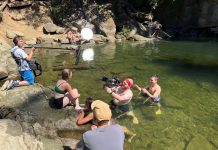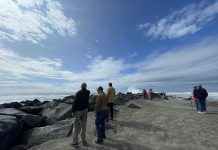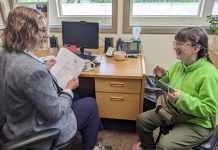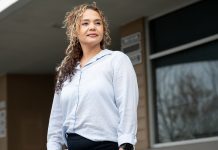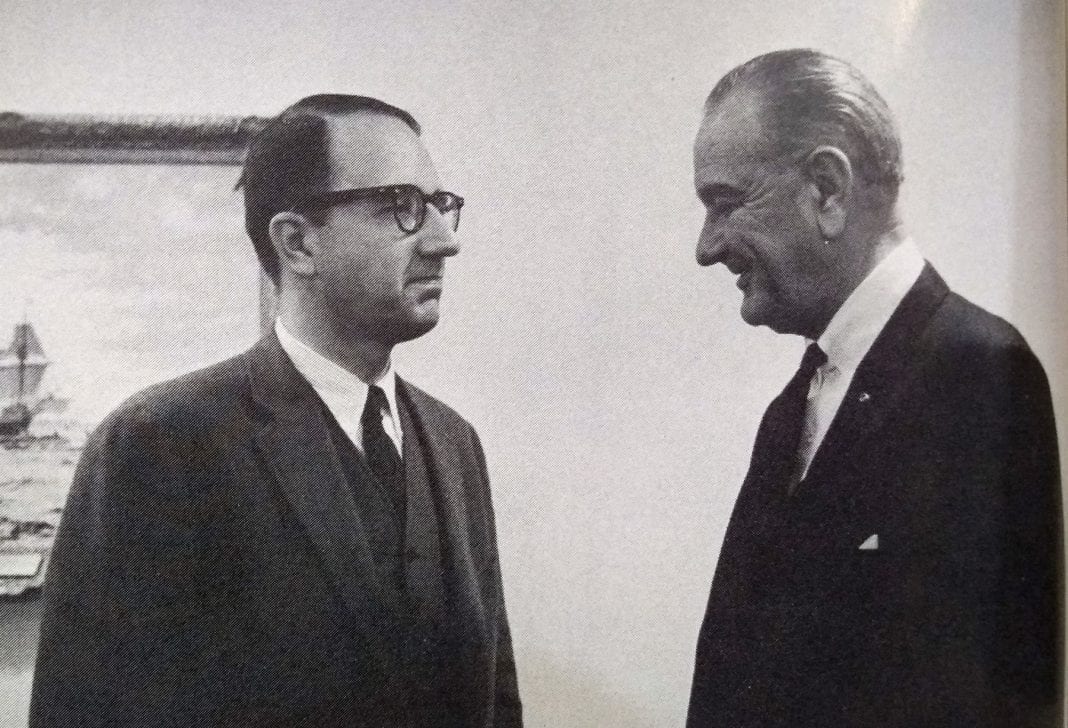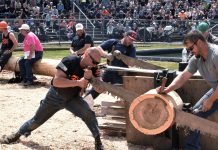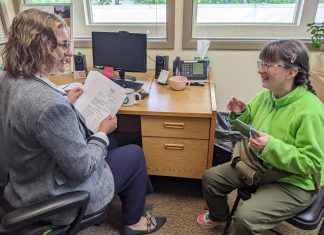Ted Van Dyk has met a few presidents in his time. Eight, actually, when you include those he met before they’d assumed the country’s highest office.
During his long career in politics, Van Dyk had the privilege of walking with Harry Truman, standing in the Oval Office with JFK, and serving as speechwriter for Vice President Hubert Humphrey. Now, long-retired at age 86, Van Dyk is back living in his hometown after decades away from it.
“I never expected to be in Washington D.C., doing a lot of the things I did,” he says. “But it turned out that way.”
An Unexpected Path
Van Dyk was born in Bellingham amid the Great Depression in October 1934. His father was a laborer at the Bloedel-Donovan Mill, while his mother worked as a bookkeeper at the Owl Drug Store at Holly Street and Cornwall Avenue.
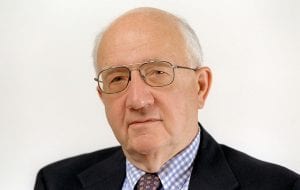
The family lived in a home on Superior Street, then the outskirts of town, with no car or telephone. Despite not being financially well-off, Van Dyk says he had a good upbringing.
A moment he credits with changing the course of his life occurred in 1941, when his family moved downtown. The move transferred him from Roosevelt Elementary’s 2nd grade class to Washington Elementary, where he tested into the 3rd grade. Skipping a year put him with different friends and experiences he otherwise wouldn’t have had.
At the end of the eighth grade, Van Dyk was hired at $2 a day to work for the city’s summer youth baseball program. Over the next seven years, he did everything from administrative work to field maintenance to coaching.
“It was just exactly the right job for me,” he says. “I was a baseball nut.”
Van Dyk aspired to be a sportswriter, and during his senior year at Bellingham High School, he wrote a weekend column in the Seattle Post Intelligencer about sports north of Seattle. Graduating from Bellingham High School in 1951, Van Dyk attended the University of Washington while spending summers working with youth baseball through his sophomore year.
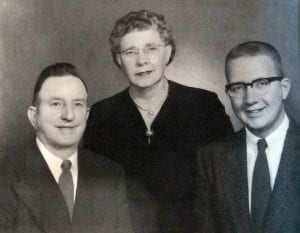
After that, he undertook graduate studies at Columbia University. While there, he was assigned the task of spending a day with former president Harry Truman in New York City.
“I took a morning walk with him, along with a couple working reporters,” he recalls. “We went back to the Astor Hotel and he bought us all breakfast and talked, and talked, and talked.”
After college Van Dyk became a Seattle Times sportswriter, manning a copydesk and covering the occasional UW football game. But his life soon changed with a shift into the Army.
In 1957, Van Dyk was called into active duty after previous time in Air Force ROTC and an Army reserve unit. Sent to Baltimore for intelligence training to serve as an analyst specializing in the Soviet Union, he again was released from active duty and remained in reserve intelligence units in New York and Boston for the next several years. In the latter city, he became a volunteer at John F. Kennedy’s 1960 presidential campaign headquarters.
The following spring, Van Dyk met his second president, now in the Oval Office. That fall, the Berlin Crisis and fears of war had him recalled to the Pentagon for his Soviet expertise. Though his military career finally ended in 1962, his time in government was just beginning.
A Political Life
Even in Bellingham, politics had played a role in Van Dyk’s life.
His father was a union-supporting mill worker once jailed for fighting strikebreakers. In 1940, he accompanied his father to the voting booth and pulled a voting machine lever to cast his father’s vote for Franklin D. Roosevelt.
In 1948, he went door-to-door with campaign literature for Harry Truman.

“I was never far out of politics,” Van Dyk says. “But it just happened that my recall in the service put me in the middle of it at a time when it was very exciting.”
After the military, Van Dyk worked for what’s now the European Union before becoming an assistant to Democratic Senator Hubert Humphrey in 1964. This translated to becoming Humphrey’s aide and speechwriter when he became vice-president in 1965, serving under President Lyndon B. Johnson. Van Dyk recalls Humphrey as kind-hearted, almost to a fault, and someone who strongly believed in civil rights and equality for all Americans.
“He was a wonderful person,” Van Dyk says. “Completely idealistic, completely committed to helping those who needed help. Everything would have changed had he, rather than Nixon, won in 1968. We became very close because, in a way, I complemented his personality.”
As a speechwriter, Van Dyk helped Humphrey publicly shift from being a skeptic of the Vietnam War to a full-fledged opponent, something that ultimately hurt Humphrey’s relationship with Johnson. Despite Johnson regarding Van Dyk as a troublemaker, Johnson sent him a personal letter after his mother’s passing in 1970.
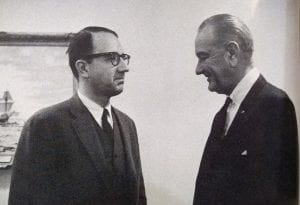
Following Humphrey’s presidential defeat, Van Dyk spent a year as vice president of Columbia before returning to D.C. to start a political consulting firm. He also worked as policy director for George McGovern’s 1972 presidential campaign. During the first year of the Carter administration, he served as a consultant and speechwriter for Secretary of State Cyrus Vance.
After three years on the West Coast as vice president of Weyerhaeuser, while also consulting for the State Department, Van Dyk returned to Washington in 1980. He became president and CEO of the Center for National Policy, the Democratic Party’s unofficial “think tank.” While there, he got to know many of the party’s members, including a young Delaware senator named Joe Biden.
Van Dyk helped Ted Kennedy’s presidential campaign in 1980, assisted Michael Dukakis’ campaign in 1988, and served as chief advisor to Paul Tsongas’ 1992 presidential run, a move that initially disappointed eventual winner Bill Clinton, Van Dyk says.
Besides political consulting, Van Dyk also wrote hundreds of op-eds for major media outlets like the New York Times, Washington Post, and Newsweek, among others.
The Halfway Point
Van Dyk finally moved back to the Northwest in 2001, becoming an op-ed columnist for the Seattle P-I. When they needed a headshot, he jokingly told them to use one from his last sports column, in 1951.
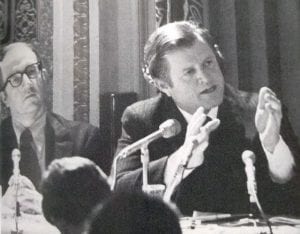
Six years ago, when the lease on his Seattle apartment expired, Van Dyk moved back to Bellingham at the suggestion of friends. He stays busy, getting out for errands and socializing. He also serves as emcee for his high school reunions, writes occasional op-eds for the Wall Street Journal, and writes almost daily Facebook missives that range in topic from politics to sports.
Van Dyk has four children scattered around the country, along with six grandchildren. His wife passed away in 1996, but Van Dyk subsequently found love again with a woman who lives in Arizona.
“I’ve had a very, very lucky life,” he says. “Just cruising along. So, I figure I’m living as if I’ve reached the halfway point.”
Although Van Dyk says he’s considered moving elsewhere, he thinks he’ll remain in Bellingham. It is, he says, the place that’s always felt most like home.
“I feel very comfortable here,” he says. “Everywhere I go, there’s something familiar. The two houses where I lived [are still here], though the schools I attended have been demolished. But I feel my parents’ presence from all those years back.”

